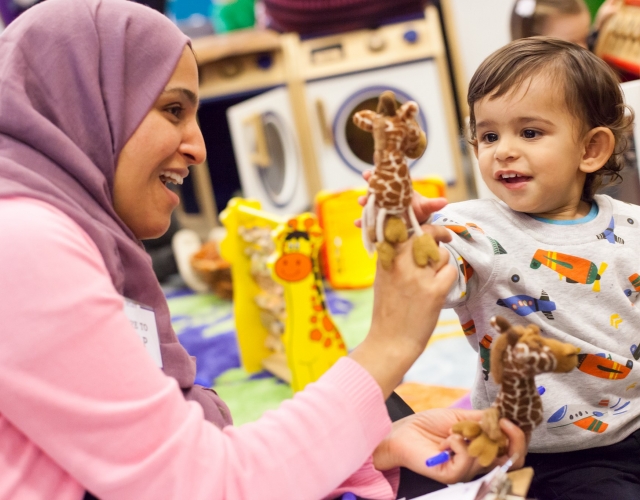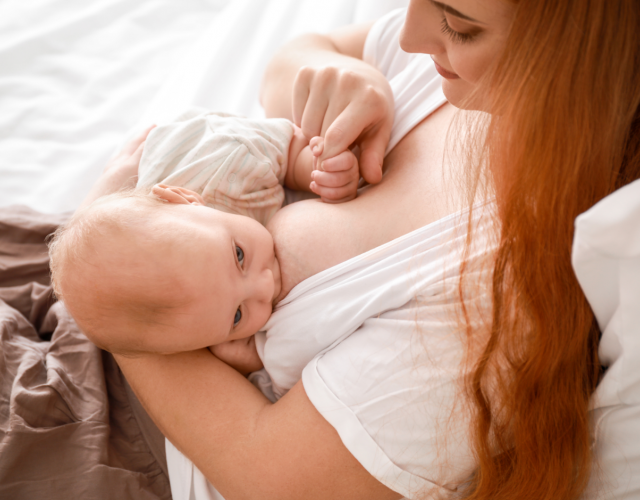Feeding your new baby
Feeding a baby, whether breastfeeding or bottle feeding, is a special time of closeness and bonding, helping to build a secure relationship between you and your baby – as well as with other care givers.
Feeding a new baby can also be a challenging time for many parents – you want to give your baby the best start but may not always be sure exactly how to do this.
Seek help from a health professional if you are worried but here are some general top tips to support you during the early weeks.
Top tips for the early weeks
- Give your first feed in skin-to-skin contact with your baby, whether it’s breast or bottle. Continuing skin-to-skin can help both baby and you feel calm.
- Keep your baby close so you can spot the early signs they are hungry. Young babies are not capable of learning a routine so when you respond to their early feeding cues they will feel safer and cry less.
- If you are worried or have any questions – call one of the many local and national help lines listed here.
- Eat a healthy balanced diet to keep you feeling well, whether you are breastfeeding or bottle feeding.
Top tips for breastfeeding
- Put your baby near the breast as soon as possible after birth – babies’ reflexes will help them to find the breast and suckle.
- Ask your midwife or breastfeeding supporter for help if your baby is struggling to latch on or you are worried about how much milk your baby is getting. The Unicef breastfeeding checklist is a useful guide about when to seek support.
- Breastfeed frequently (at least 8-12 times per 24 hours) – the more often you breastfeed (or express) the more milk you will make.
- Make yourself comfortable when you feed – find a position where you feel relaxed and use cushions and pillows to support you.
- Offer the breast to soothe your baby – you cannot over feed as breastfed babies will stop drinking when they have had enough.
- When you’re breastfeeding you’ll probably feel extra hungry and thirsty – just listen to your body and eat when you’re hungry and drink when thirsty.
- Drinking a small amount of alcohol is ok when you’re breastfeeding. The NHS suggest not having more than 1-2 units of alcohol once or twice a week.
Top tips for bottle feeding
- Treat feeding as a special time of closeness – being fed by just one or two close care givers in the early days will be less stressful for your baby and help you and your baby to bond.
- Hold your baby in a supportive, semi-upright position against your body so it's easier to allow for natural pauses during feeding by easing the bottle out slightly.
- During feeds, look and smile at your baby and return their gaze. Change sides halfway through feeding or alternative feeds - this will help to develop both eyes equally.
- Tune in to your baby’s signs of fullness and stop feeding even if there is still milk in the bottle.
- Comfort your baby with cuddles if they want to be held and they have recently had a bottle feed, and you know they are having enough milk.
- Follow instructions and sterilising guidance when making up and storing bottles. Click here for NHS guidance on making up baby formula.
- Despite all the different kinds of formula on sale, babies up to the age of 12 months only need first infant formula (as well as or instead of breast milk), unless you are advised otherwise by a medical practitioner. And from 12 months babies can drink cow’s milk or a non-dairy alternative (as well as breast milk if you are still breastfeeding), so there is no need for follow-on formula.

Tips for talking
There's lots you can do during your daily routine to help your children become confident communicators

Tips for boosting our batteries
Family life can be stressful - taking time for ourselves can help us juggle things more easily


